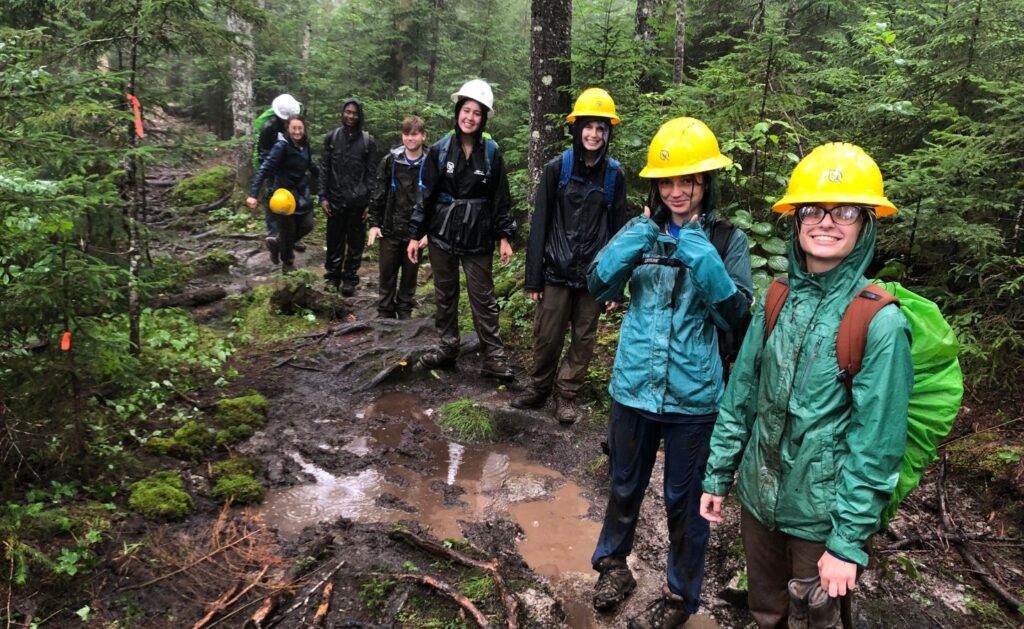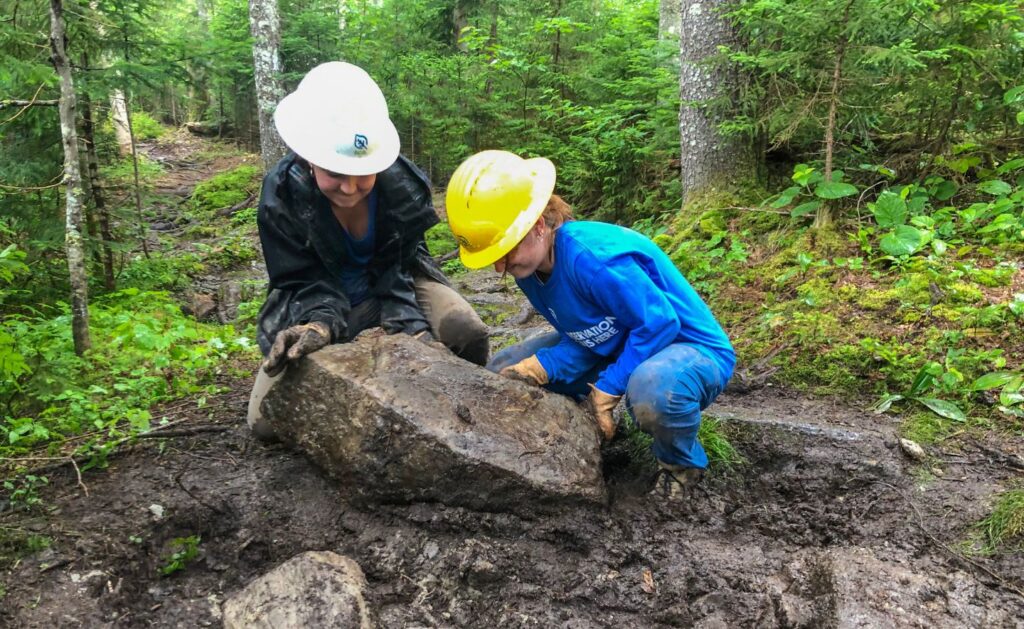The SCA’s National Conservation Crews for high schoolers offers program participants a chance to visit places they’ve never seen before and enjoy nature at its best.
While working on the crew, participants live on-site in tents, cook their own meals and get to explore local outdoor recreation opportunities on non-workdays.
This summer, the 2023 Appalachian Trail National Crew spent four weeks along mile 1,977 of the Appalachian Trail near Rangeley, Maine, in partnership with the Appalachian Trail Conservancy.
The crew of six high school students worked on several projects across a two-mile stretch of trail that needed numerous stepping stones and water bar installations to prevent erosion and improve safety.
In some boggy areas, the crew removed previously installed wooden log bridges that had decayed, replacing them with stepping stones that will last for decades.

The 2023 Appalachian Trail Crew on the trail near Rangeley, Maine. The crew spent four weeks working to prevent erosion and improve safety on the trail. (Photo Credit: Ma’yet.)
“I’ve always lived in big cities and am not used to a lot of nature. I just loved it. It was the best summer experience I have ever had,” said crew member Clemence Gaume, 16, who made the trek to Maine from Singapore. “Setting a stone on the trail is like setting your mark. At first, it was really hard. But once I put in my first stone, I knew I could do it. The hard work brings you closer because you must work together to complete the work. You get to leave with a deeper connection to the outdoors and friends for life.”
With every SCA experience, participants complete projects that solve real conservation challenges and see the tangible results of their labor. Following unprecedented amounts of rain during the summer season, through this work, the crew members learned first-hand how to impact the world around them while learning to explore and grow.
“I am endlessly grateful to have had the opportunity to understand the pivotal role that human connection plays in conservation—from the universal joy expressed by hikers that have spent weeks or months with a chorus of woodpeckers and rustling leaves harmonizing with their steps to the unending kindness shared by Rangeley folk both on- and off-trail,” said Megan Miller, 16, of New York.

2023 Appalachian Trail Crew Members moving boulders. (Photo Credit: Ma’yet.)
The Appalachian Trail is a 2,180+ mile long public footpath that traverses the scenic, wooded, pastoral, wild and culturally resonant lands of the Appalachian Mountains.
Conceived in 1921, built by private citizens, and completed in 1937, the trail is now managed by the National Park Service, U.S. Forest Service, Appalachian Trail Conservancy, numerous state agencies and thousands of volunteers.
“What I’ve taken from the SCA is how environmental conservation impacts people. Helping people feel safe and included in the outdoors is a big reason I keep returning to the SCA,” said multi-season crew member turned crew leader Ingrid Piña, 23, of Houston. “Working with the SCA has given me great confidence that has helped me in all realms of my life. If I ever feel shy or nervous, I can think back to my time with the SCA, pushing through uncomfortable moments and knowing I can do hard things. You can see that same confidence building in the crew members.”

A fox stands in the road along the Appalachian Trail near Rangeley, Maine. (Photo Credit: Ma’yet.)
The crew was nestled in the shadow of Mount Katahdin, just south of Baxter State Park in Maine, where The Nature Conservancy’s Debsconeag Lakes Wilderness Area manages nearly 500,000 acres of contiguous conservation land.
Debsconeag means “carrying place,” named by the people of the Penobscot Nation for the portage sites where they carried their birch bark canoes around rapids and waterfalls. The area contains the highest concentration of pristine, remote ponds in New England and thousands of acres of mature forests.
Before joining the crew in the field, crew leader Ma’yet, 47, of Portland, Oregon, backpacked 100 miles solo along the Appalachian Trail. Despite the continuous rains, the former science teacher was impressed with how the crew members battled the elements from heavy rains and smoke from the Canadian wildfires and disconnected from technology.
“Hiking, camping, and backpacking are something I do regularly. The hardest part was all the rain. It was a constant battle. Everything was green and wet,” they said. “It was nice to see the crew members develop and grow. Everybody acted as a community. This is a life-changing experience that, if you lean into it, will fundamentally change your life in a positive way. It helps you learn more about yourself and what you’re capable of and that there is beauty outside of technology.”